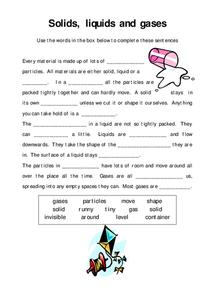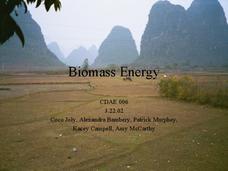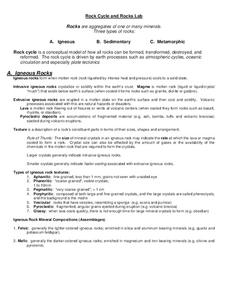National Park Service
Reduce Our Carbon Footprint, Let’s Compost!
Roll up your sleeves and get a little dirty with this elementary and middle school compost lesson. All you need is a large plastic container, a couple old newspapers, some organic waste, and a few hundred worms and you're ready to start...
Curated OER
Peer Review Form for Scientific Writing
A peer review form just for science? Specifically tailored for science writing, this resource asks editors to give detailed responses to questions about the relevance of the study, the clarity of the hypotheses, the methods, materials,...
Museum of Science
Virtual Heart
No more beating the pavement to find a virtual model of the human heart. See one in continual real-time motion, and layer it to highlight electrical impulses, blood flow, and valve activity.
Santiago Canyon College
Taking Notes for Science Class
Provide young scholars with the tools they need to succeed with this reference on the Cornell note-taking strategy. By breaking the content of lessons into main ideas, supporting details, and overall summaries, students are able to...
Cornell University
Garden Math
Young scientists must put their math caps on and figure out what fraction of each flower is in a raised flower bed. They must problem solve to simplify the fractions, and then graph the amount of flowers that are in different flower beds.
CK-12 Foundation
Development of Hypotheses: Pressure versus Temperature
Is it me, or is it getting hot in here? Middle school science sleuths investigate the relationship between temperature and pressure, then use their observations to form a hypothesis. Questions embedded in the interactive help guide...
Museum of Science
Solar Cooker
A warm, sunny day is perfect for eating great food and learning about science at the same time. Future engineers build solar cookers to prepare food using the Sun's rays. They learn how energy converts from solar energy to thermal energy.
Museum of Science
Stomp Rocket
It doesn't take rocket science to launch a rocket. A fun activity has pupils build a rocket that launches when they stomp on a plastic bottle. They learn how the escaping compressed gas from the bottle causes the rocket to fly.
Curated OER
The Greenhouse Effect
In this Earth Science worksheet, students read about the Greenhouse Effect and the difference between natural and amplified warming. Following, they answer ten short answer questions related to what they read about global climate issues.
Curated OER
Finding Ocean Depth
How to oceanographers measure the sea's depth? Your scientists will step into their shoes in this application worksheet, first reading about how the speed of sound and a simple formula give scientists a depth estimation. Students...
Curated OER
Solids, Liquids, and Gases
In this phases of matter worksheet, students complete 13 fill in the blank spaces with science words from the given word bank. The blanks are placed within an informational paragraph about solids, liquids, and gases.
Curated OER
Global Warming Webquest - Policy Analyst
In this science global warming worksheet, students, working in groups, answer 7 short answer questions regarding the policies of becoming a policy analyst in California.
Curated OER
Steps of the Scientific Method
Steps of the scientific method are summarized, and then an example experiment is presented to allow practice identifying the steps. The graphics and animations are a little blurry, but this otherwise well-formulated presentation will...
Curated OER
Characteristics of Living Things
Have your life science learners draw a graphic organizer as they view this PowerPoint. One click at at time, it presents the characteristics of living things in an organized manner, and tacks on a cute picture to help illuminate each....
Curated OER
Absorbancy: What does it mean?
Define the scientific concept of absorbency as it relates to the properties of matter, then conduct an investigation. Learners answer several questions, then investigate the absorbency of several different types of towels. Tip: This...
Curated OER
Effects of Ozone Depletion
Explore the causes of ozone depletion and the effect on plankton, algae, plants, amphibians, and humans. Learn how the Montreal Protocol has possibly helped reverse the decline of the ozone layer. Warning: photos of skin and eye damage...
Curated OER
Biomass Energy
Consider biomass as an alternative energy source with this PowerPoint. Environmental science pupils discover the potential of converting gases produced by landfills into useful energy. They compare and contrast environmental and economic...
Science Teachers
Organ Systems Crossword Puzzle
An attractive and informative body systems crossword plus its answer key is provided for your life science learners. The topic is the organs. With 23 prompts to address, they are sure to get a complete review in identifying the systems...
Illustrative Mathematics
Accuracy of Carbon 14 Dating II
The scientific issue of carbon-14 dating and exponential decay gets a statistics-based treatment in this problem. The class starts with a basic investigation of carbon content, but then branches out to questions of accuracy and ranges of...
Virginia Department of Education
Formulas and Percent Compositions of Ionic Compounds
Try not to blind anyone with science by following the safety rules. The lesson encourages scholars to form an ionic compound from magnesium and chlorine. Then they determine the empirical formula and determine the mole ratio and percent...
Virginia Department of Education
Isotopes
Lead your class through the amazing world of isotopes as they investigate the various properties they contain and further understand their respective location on the periodic table. They explore half-lives and radioactivity as each...
Virginia Department of Education
Average Atomic Masses
Facilitate learning by using small objects to teach the principles of atomic mass in your science class. Pupils determine the average mass of varying beans as they perform a series of competitive experiments. They gather data and...
University of New Orleans
Rock Cycle and Rocks Lab
Science rocks! Explore three types of rocks and the rock cycle with an igneous rocks experiment. Pupils discuss textures, composition, and learn how melts are formed from the Earth's crust. They weigh materials using a scientific scale...
CK-12 Foundation
Direction on the Earth: Using a Compass
Navigate the world of orienteering in an informative interactive. Earth science scholars learn practical direction skills, such as proper polar coordinates and pairing compasses with maps. The interactive map allows them to practice...
Other popular searches
- Earth Science
- Physical Science
- Life Science
- Science Project
- Science Space
- Environment Science
- History of Science
- Environmental Science
- Pe Science
- Family and Consumer Science
- Consumer Science
- Social Science

























